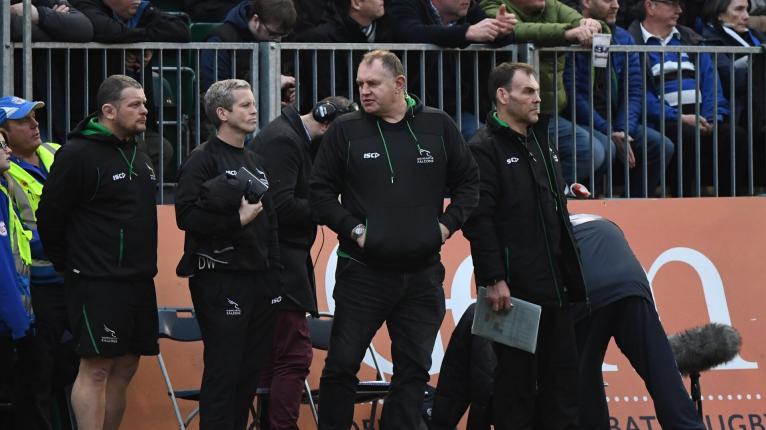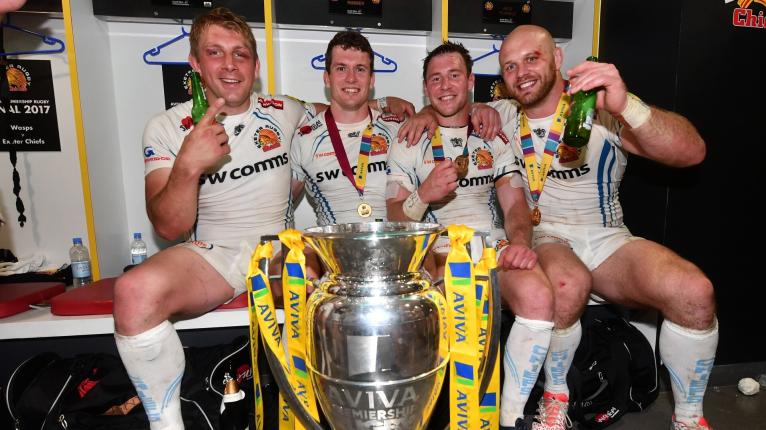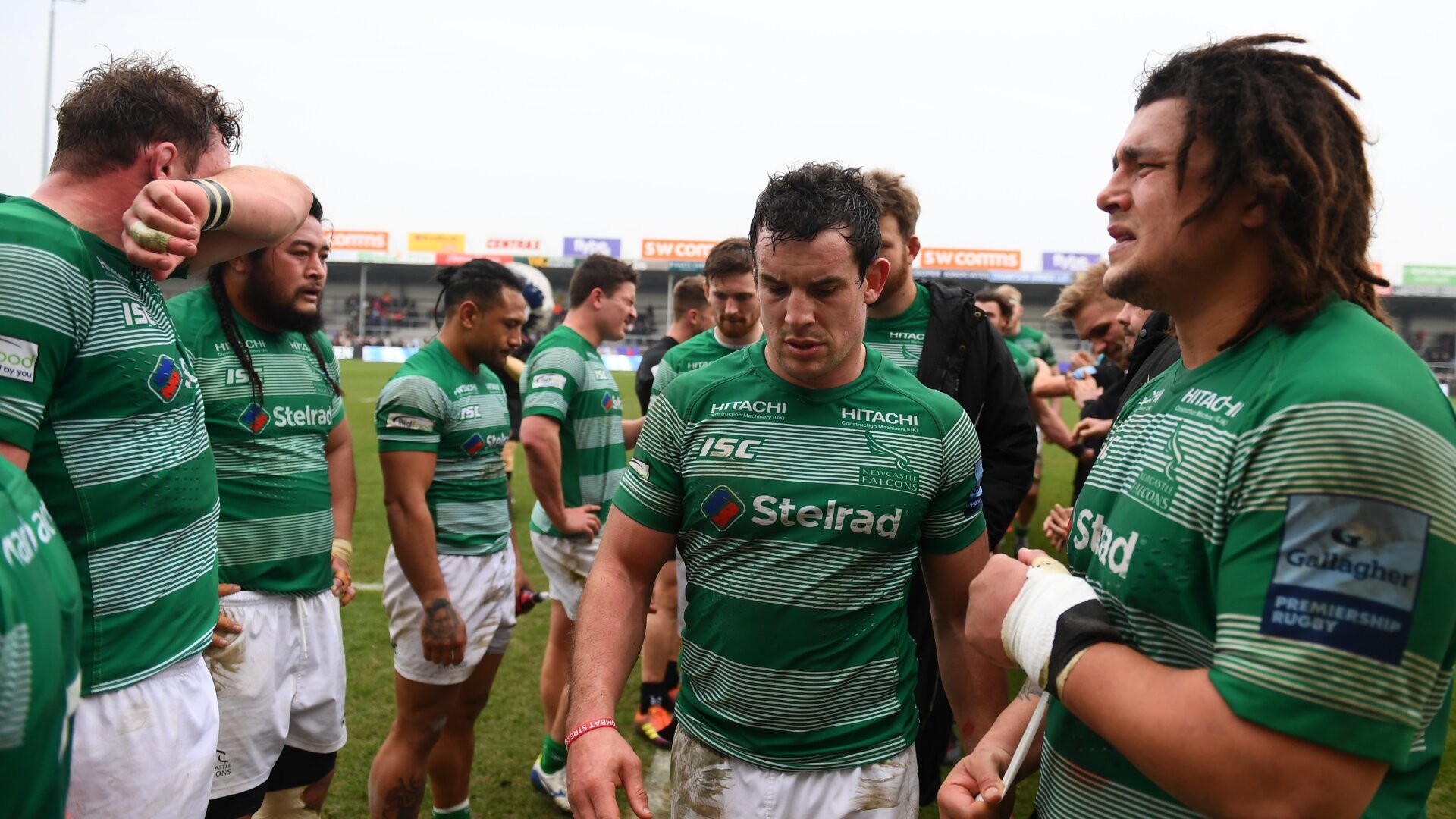'We have currently 11 of 12 clubs about to lose money for the third year running...it's a broken model'

Newcastle chief Mick Hogan has called for an end to Premiership relegation on the eve of a match that will have a huge say in whether the Falcons preserve their top flight status for next season.
The Semore Kurdi-owned club are favourites for the dreaded drop to the Championship, a favouritism that will be reinforced if the bottom side fail on Sunday to beat nearest strugglers Worcester, who are nine points above them along with Bristol with eight matches remaining.
Managing director Hogan believes the league needs to be ring-fenced for the sake of its financial future and quality of entertainment. “I’m not saying this just because of the fact we’re currently in 12th and would be favourites to go down. It’s a view I have held consistently,” he said.
“I don’t think it’s the same in every sport. I fully support promotion and relegation in football because it has got so many big clubs and the gap, while it is there, is not as big. The gap now in between the (rugby) Premiership and Championship is enormous and it’s only really the top team, London Irish, that have any chance of coming up and kicking on.
“The other thing people say is ‘you’re stopping the aspirations of smaller clubs’. Listen, they have had 25 years to get to the Premiership. How long do they want? It’s fair to say that if it hasn’t happened after 25 years it’s probably not going to happen.
(Continue reading below…)
“And if you come up now with the way the system is and the funding and all the rest, you’re going to need £20/£25million to stay up there. That is too much money that is going to have to be spent to sustain the club at an artificial level.
“I do get the argument as well where you can’t stop the aspirations, but at what cost? We have currently got 11 of the 12 clubs about to lose money for the third year running. It’s a broken model.
“A broken model because we’re all spending far too much money on players – and for six or seven of the clubs that money is not spent on players to try and win the competition, it’s spent on players to try and stay in the competition. That’s not right.”
They don't come much more important than this for @FalconsRugby ?@WorcsWarriors will be looking up the table after a nerve-racking late victory on the weekend ?
Start of a Falcons resurgence? ?
Read more:https://t.co/EAZ6Q0yt6Z pic.twitter.com/uSpLBNSWwq
— Premiership Rugby (@premrugby) February 27, 2019
Ranked 10th out of 12 in the top flight in terms of turnover and wage bill, Newcastle, who have just three wins in 14 games this season, are a club whose crowds are lower than the league’s average and struggle to reach the salary cap’s ceiling.
Hogan believes ring-fencing would attract more investment into the league and encourage clubs to throw off the shackles on the pitch, providing spectators with a more glittery spectacle.
“If we had a Championship that was at the level of investment and the size of the clubs in the football, I’d be all for it. There’s an obvious reason why there is promotion and relegation within football. They have 92 professional clubs.

“We have got within rugby only 15 full-time clubs. The rest in the Championship are part-time. I get that promotion is great for clubs and everyone points to Exeter. Now Exeter did a fantastic job in getting up and then they have kicked on from there, but Exeter are very much the exception rather than the rule.
“For every Exeter there has been a Rotherham, there has been a London Welsh, there been a Leeds who have gone down. Worcester and London Irish have been up and down a number of times. Bristol have been up and down a number of times. There are far more examples of where promotion and relegation doesn’t work and perhaps one obvious example where it does.
“It can prevent long-term thinking, it can prevent investment. It just puts strain on vision. I know that people say it’s about rugby, it’s on the field. I get all that but I just believe as well that squads would be stronger if we didn’t have relegation because clubs would invest more in English-qualified players and take a longer-term view on them.
? Your #GallagherPrem table ?
@ExeterChiefs return to the summit of the table ?
It's anyone's guess for those coveted 3rd and 4th spots ? after @gloucesterrugby ? @Harlequins ? @SaleSharksRugby and @SaintsRugby all picked up big wins ?
Who will make the top 4?? ? pic.twitter.com/A75hvzhxFc
— Premiership Rugby (@premrugby) February 24, 2019
“I’ll throw this stat at you – six of the seven World Cup winners so far have come from a system where there is no promotion and relegation. The only one is England and that was 16 years ago. Are the two linked? I think they are because we have a style of play now in the Premiership that is all about not losing. It’s not very expressive as some of the other nations.
“Again, you look at the PRO14 where there is no promotion and relegation. How many of their teams have won the Heineken Cup and have been doing better and better year on year?

“Wales will probably win the Six Nations this year. Ireland have been dominant recently. It’s such an attritional game now that you have to be able to rotate squads perhaps more than we are able to in the Premiership and you can do that if you know there is no fear of relegation.
“It [no relegation] doesn’t stop the ambition of clubs like Leinster wanting to win every year and Scarlets, there is no lack of ambition in the PRO14. But what there is is a system without relegation that promotes entertaining rugby.
“The Premiership does as well, don’t get me wrong. But it’s not that negative approach to playing you can get in the Premiership.”





























